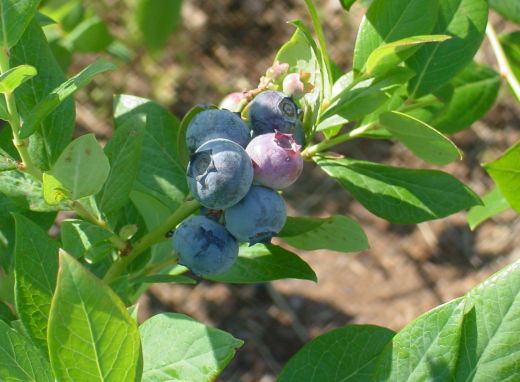At a Glance
Suziblue is an early season southern highbush blueberry that flowers and ripens about the same time as Star and one week later than Rebel. Suziblue plants are vigorous, precocious and have a semi-spreading bush habit with a medium crown. Leafing has been very good, even following mild winters. Plants can hold older leaves through the winter in south Georgia.
Fruit
Suziblue is suggested as a main season southern highbush variety where firm, large fruit is desired. Suziblue berries are similar in appearance to Star and Rebel fruit, but Suziblue has better berry firmness, size and overall superior cropping than Star and larger berry size and better overall flavor than Rebel.
Suziblue may be a candidate for machine harvesting as berries generally hold firmness well. However, Suziblue’s tight clusters likely require hand harvesting during first harvests.
Cultivation
Plants of Suziblue are self-fertile, but using a companion variety to enhance pollination and berry size is recommended. Rebel is suggested as a companion.
Testing
Suziblue has performed very well in trials in both south and middle Georgia, and test plots in California have shown it to be very productive there as well.
Suziblue was selected in 2002 at the Georgia Experiment Station in Griffin, Ga., from a group of seedlings of the cross, Star X TH-474, planted in a nursery in 1999. Suziblue has been tested as selection TH-730 at multiple sites in middle and south Georgia since 2003.
In the Griffin location, berry weight of Suziblue has been larger than Star, averaging 2.2 to 2.8 grams per berry compared to 1.5 to 2.2 grams per berry for Star. Suziblue berries grown in Griffin also had a noticeably sweeter flavor than Rebel berries, which have a mild to bland flavor.
Development
Developed by D. Scott NeSmith as TH-730, Suziblue Southern Highbush has a complex pedigree involving multiple Vaccinium species, including V. corymbosum, V. ashei and V. darrowi. Suziblue is a 2009 release by the University of Georgia College of Agricultural and Environmental Sciences and the University of Georgia Agricultural Experiment Stations. This protected blueberry variety can be sold only by individuals licensed by the University of Georgia Research Foundation (UGARF) and Georgia Seed Development (GSD). USPP 21,167.
Breeder

D. Scott NeSmith
Dr. D. Scott NeSmith’s blueberry research program at the University of Georgia emphasizes new variety development as well as cultural management of blueberries for the southeastern United States.
Since taking over the UGA blueberry breeding program in 1998, Dr. NeSmith has released and patented 10 new commercial blueberry varieties and two ornamental blueberry varieties. His breeding program is now considered one of the most active low- to-mid chill blueberry programs in the world. He joined UGA in 1990.
Dr. NeSmith has expanded UGA’s program globally through collaborative projects throughout the U.S. and many other countries including South Africa, Argentina, Chile, Uruguay, Japan, Europe, Morocco, Australia, New Zealand, South Korea, Peru, and Mexico. Much of his cultural management research has been with growth regulators in blueberries. He also conducts experiments on plant establishment, pollination, and post-harvest quality.
Dr. NeSmith is a member of the American Society for Horticultural Sciences (ASHS) and the International Society for Horticultural Sciences. He is a past President of the Southern Region ASHS and has served as an Associate Editor for the ASHS journal, HortScience.
Dr. NeSmith has received the D.W. Brooks Excellence in Research Award from UGA and in 2011 was selected as a Fellow of the American Society for Horticultural Sciences. He has published more than 250 research papers, including more than 97 in refereed journals, and has received two awards for outstanding publications.
He graduated from the University of Georgia with B.S. and M.S. degrees. He obtained his Ph.D. from Michigan State University.
Affiliations
- Department of Horticulture
- University of Georgia, Griffin Campus

